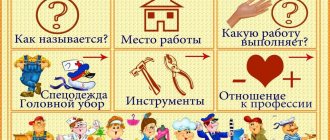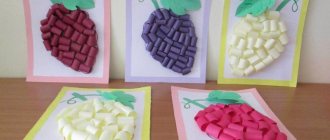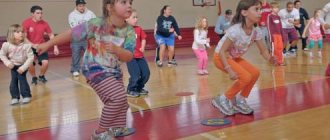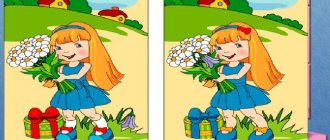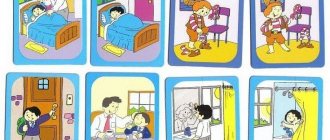General recommendations for conducting speech therapy classes on the topic “Professions” in a preschool educational institution
When conducting a speech therapy session “Professions”, it is important to take into account the characteristics of children’s perception. Children do not yet have self-discipline skills. Therefore, it is important that the activity is playful in nature and captivates them.
Hint for writing a story
Developmental activities for classes
When conducting classes, not only games can be used that expand the children’s knowledge, but also exercises to learn how to correctly pronounce sounds in words and improve speech skills. It is recommended that you plan your children's learning in the coming weeks.
Games on the topic: “Professions”
In this case, riddles and questions are asked, the answers to which expand the children’s knowledge about various specialties. Sometimes false statements are made so that kids will find a mistake.
Stories relating to various specialties are compiled.
List of reading materials for the group
When lexical topics in speech therapy related to professions are considered, for example, reading the following works can be used to work with children:
- J. Rodari “What color are the crafts.”
- Y. Akim “Neumeika”.
- A. Shibarev “Mailbox”.
Note! Reading and discussing works of fiction will help children better understand the topic they are studying. It is useful if such readings are additionally carried out by their parents at home.
Thematic physical education minute
The following describes one example of physical education.
Kids perform movements while the teacher reads the poem “Postman”:
What the postman brought us (Clenches his fists)
He walks around with a thick bag
Translation, magazine, newspaper
There are two cassettes in the parcel (Kids straighten and bend their fingers)
And a letter from Aunt Valya
So that they await her arrival (Hands spread to the sides).
Gymnastic exercises
Typically, physical exercises and finger gymnastics are used during classes. At the same time, the teacher reads a poem related to the topic under consideration. At certain moments, children perform movements that relate to the spoken phrases. If necessary, the teacher tells you what to do.
Using interactive whiteboards and ICT in the learning process
The use of ICT makes it possible to offer children exciting educational computer games.
For example, they may be offered pictures of people and objects that they use in their work. At the same time, children will have to describe in words what is shown in the pictures and write a short story about this profession. The use of computer technology can expand the learning opportunities for preschool children. However, it is necessary to teach children to work with it in subgroup classes.
Age characteristics and correction of speech disorders during group classes
Knowledge of the peculiarities of the lives of adults related to their work is vital for children, but at different ages the approach to studying issues related to professions should be different. He must take into account the age characteristics of the children.
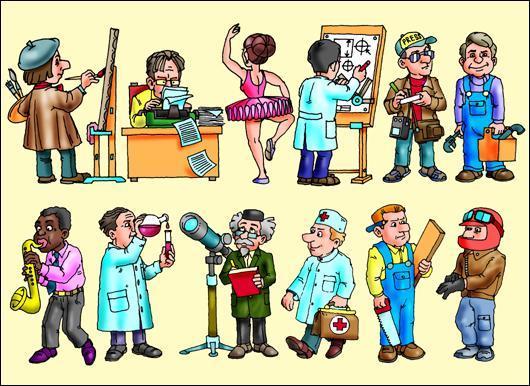
Poster about different professions
Lexical topic “Professions” in the middle group
Classes in the middle group not only develop speech skills, but also provide basic knowledge about what professions are and what they are like.
Purpose and objectives of the lesson: getting acquainted with different professional specialties
The following tasks are performed:
- When working with children, they are given the concept that there are different professions and are told about their main features.
- Vocabulary develops, articulation improves when pronouncing sounds.
- Children develop auditory attention and logical thinking.
It is recommended to plan classes for the near future.
Brief lesson plan
Finger gymnastics is performed with children. It is done as follows:
Producing vowel sounds in children
There are many noble professions (In this case, in turn, each finger of the right hand is connected to the thumb).
Both useful and pleasant (Make the same movements with the fingers of your left hand).
Cook, doctor, painter, teacher, salesman, miner, builder (Connect the fingers of the left hand and right hand with the thumbs).
I don’t name everyone at once (at the same time, the kids clench and unclench their fists several times).
I suggest you continue (children stretch their arms forward, keeping their palms facing up).
Next, the teacher conducts a poetic dialogue with the kids: “Was there a shoemaker?/Was!/Sewed boots?/Sewed!/Who are the boots for?/For the neighbor’s cat!” This exercise is designed to improve the clarity of diction and work on the expressiveness of the pronunciation of sentences.
The lesson uses tongue twisters to develop clarity of pronunciation and correct pronunciation of various sounds. At the same time, the teacher and the children try to pronounce certain phrases. Here is an example of a tongue twister: “The leaking faucet really wants the plumber to fix it.”
Important! Throughout the lesson, children are given a variety of vocabulary exercises.
Thematic poems and tongue twisters
The poetic form of presenting material to children helps them better assimilate the material. Therefore, it is important to use poems and read them aloud to the teacher together with the children. One of the exercise options is to ask poetic riddles.
Here are some examples:
- “Doctor, but not for children, but for birds and animals. He has a special gift. This doctor..." (Vet).
- “We teach children to read and write. Love nature, respect the elderly." (Teacher).
- “At work, day after day, he commands with his hand. That hand raises. A hundred pounds under the clouds." (Crane operator at a construction site).
Tongue twisters not only allow you to improve your vocabulary, but also provide an opportunity to improve children’s diction.
The following tongue twisters can be used:
- “Sailors in sailor suits. Sailor suits in stripes."
- “Two woodcutters, two woodcutters are chopping wood with axes in the yard.”
- “The weaver is weaving fabric for Tanya’s dress.”
When working with children in a speech therapy lesson on the topic “Professions,” the following game can be used. It's called "Fable Poems."
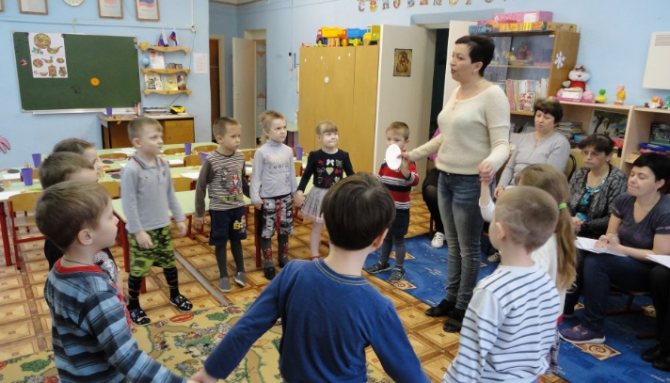
Speech therapist session with children
Its goals are: improving auditory attention, improving the ability to think logically, and developing children’s vocabulary related to the topic of professions.
The game consists of reading poems about the professions of adults to children, and in them the teacher makes erroneous statements. Kids are required to determine what is true and what is not. At the same time, the speech therapist and children discuss the answers in detail.
Lexical topic “Professions” in the senior group
Important! At this age, children are able to master not only basic concepts about various specialties, but also begin to create general ideas about the world of adults and the place that professional activity occupies in it.
Objectives of the lesson: forming a holistic picture of the world
Children are taught to briefly talk about their professions. During the lesson, they learn more about the types of activities adults do. When assignments are completed for children in the speech therapy group on the topic “Professions,” children are taught that work is necessary and its social significance is explained.
Kids are trained to form masculine and feminine words from the names of workers (military and military, teacher and teacher).
Note! Children develop the ability to recognize speech by ear, improve visual perception and attention. They are helped to develop memory, attention and the ability to speak coherently.
Children are encouraged to be active, take initiative, and have the ability to work collectively.
Lesson outline
When considering lexical topics in the senior group, a thematic physical education session first takes place.
A conversation is held about what a profession means for an adult. They talk about how there are different professions and give relevant examples. They talk about the need to earn money to buy household items that the family needs.
How to get into a speech therapy group in kindergarten
The story is told on behalf of the kids who were arguing about whose profession was more important. The teacher and children discuss this dispute and give their answers.
A rhyming game is being played. For example, phrases are uttered about professions related to transport: “The train is driven by ... (driver). Plowing the field... (Tractor driver)..." Children must complete each phrase.
Children take cards out of envelopes and see pictures of a person working. They should talk about his specialty.
Children, with the help of a teacher, compose their stories about various professions, guided by a rough plan and pictures.
A physical education session is held. At the same time, poems about professions are read, during which children imitate the corresponding movements.
The teacher gives phrases, and the children guess who could say them.
Kids are asked to name workers in masculine and feminine genders (for example, pilot).
In conclusion, the results are summed up, the teacher reminds the children what new they have learned.

Children are told about professions
Game technologies in education
In the process of working with children, lexical exercises are actively used and physical education sessions are held. Children are taught to independently compose simple stories about various specialties. Questions and riddles are actively used, to which children must find the answer.
Lexical topic “Professions” in the preparatory group
At this age, it is important to prepare people for school, to give them knowledge of how adults live.
Purpose and objectives of the lesson
In classes with preschoolers, it is necessary not only to expand the vocabulary related to the topic under consideration, but also to form their horizons, make knowledge more systematic, develop children’s communication skills, and the ability to coherently express their thoughts.
Activities
At this time, physical education and game moments are still important, but the formation of an outlook, the ability to express one’s thoughts and the ability to conduct a focused dialogue with other people are of particular importance.
Preliminary work on studying literary material
The teacher tells the children about descriptions of various workers that are available in children's literature.
The children read aloud thematic literary works.
Equipment
When the lexical topic “Professions” is considered in the preparatory group, pictures are needed as handouts. They should depict representatives of various professions.
Note! The teacher should have prepared demonstration images on the topic of the lesson. A board or screen can be used on which visual material will be shown.
Approximate plan of work on the lexical topic “Professions” in the senior group
Sample work plan
on the lexical topic “Professions” in the senior group
Topic of the week: "
Professions
»
Educational objectives:
* Enrich children’s understanding of the work of adults, the variety of professions, develop respect for workers of different professions in conversations: “All professions are important, all professions are needed!”, “What professions are there?”
* Expand through conversations, creating problem situations: “Healthy, harmful foods”, “If you are sick”, children’s ideas about nutrition, cultivate a desire to eat healthy food, maintain and strengthen their own health, and lead a healthy lifestyle.
* Continue to develop in children the ability to draw people in motion, the ability to create a composition: “Who do I want to become.”
* Teach children to jump rope, strengthen the technique of spinning and jumping rope.
* Develop in children the ability, together with other children, to develop a role-playing game with a plot: “Designer”: the plot of “building a design office”, the ability to negotiate, discuss the actions of everyone playing in the game.
* Learn to count within 7
, the formation of the number 7 based on a comparison of two groups of objects expressed by the numbers 6 and 7.
* Teach children to compose descriptive stories about people of different professions, using a plan diagram, to compose and use complex sentences in speech.
* Develop children's knowledge about the work of S. Mikhalkov; introduce the work of Uncle Styopa, teach how to answer questions about the content of the work.
*Develop curiosity and attention in children through experimentation and experiments: “How many layers of soil? Which ones?”, “The Wizard Lemon”, “Study of the properties of the dough. What can you make from the dough?
* Develop children's skills for safe behavior at home, teach them adequate actions in fire situations.
* Continue to develop in children knowledge about changes in nature that occur in the fall, about the adaptation of plants to winter: stems and roots die, but seeds remain.
* Encourage parents to organize joint family leisure time and to search for ways and means of artistic expression to create the image of a particular profession. Invite parents to help children compile the album “There are different professions”
Vocabulary work:
Nouns: Cartographer, meteorologist, geologist,
tractor driver, carpenter, map, doctor, builder, teacher, photographer, cook, hairdresser, tailor, shoemaker, baker, writer, driver, librarian, salesman, painter, bricklayer, electrician, crane operator, excavator operator, architect, pediatrician.
Verbs: treats, teaches, educates, cooks, photographs, cuts, styles, looks after, sews, cuts, bakes, stews, cooks, writes, composes, sells, drives, carries, gives out, looks after, lifts, manages, paints.
Adjectives: kind, attentive, caring, responsible, professional, skillful, knowledgeable, conscientious, disciplined.
Adverbs: easily, hard, conscientiously, skillfully.
Subject development environment:
Add to group
visual material on the topic
“
Professions
”.
Fill the corner of the book with the following works: “Who to be?” I. Karpova (series of books about professions), “What do you have?” S. Mikhalkov, “Who to be?” V. Mayakovsky, “Builders” B. Zakhoder, “Uncle Styopa is a policeman” S. Mikhalkov, “What do crafts smell like?” D. Rodari, “Doctor Aibolit” K. Chukovsky, “Dunno in the Sunny City” N. Nosov, Y. Akim “Incompetent”, S. Baruzdin “Mother’s Work”, S. Marshak “Fire”. Introduce didactic and board games :
“Professions”, “Who should I be?”, “Associations”, “Who needs what for work”, “Who made these items”. Center for role-playing games: attributes for games, substitute items for games, replenish s/r.
game “Firemen”: Layout “Fire Shield”; “Geologist”, “Cartographer” maps-schemes. Center for construction and constructive games :
building materials (large and small), Lego constructor. Center for productive activities: materials and tools for drawing, modeling, appliqué and artistic work, books - coloring books of a thematic nature, coloring books on the theme: “Professions”, “Kindergarten”. Screen: “Dangerous objects in everyday life.”
Final event on the topic of the week:
Exhibition of drawings: “Professions”. Collage: “Professions of our parents.” KVN “What crafts smell like.”
Interaction with children
Conversation (the world around us):
“All professions are important, all professions are needed!”, “Captain, navigator - aircraft and ships”, “Professions of mom and dad!”
Conversation (cognition):
“Professions: “Cartographer”, “Meteorologist”, “Geologist”, “What are the professions?”
Conversation (valeology):
"If you're sick."
Health games:
Finger games: “Seamstress”, “Brave Captain”.
Walking barefoot on rugs. Breathing exercises: “Pump”, “Pendulum”.
Gymnastics after sleep:
"Merry Artists"
Design:
From paper boxes: “Houses of our city”, “We are builders - we will build a house for our family, a garage for a car, sheds for animals.”
Simulation Games:
“Tell poems with your hands”, “If you like it, then do it this way...”, “The sea is agitated” (with the words “Show me your planned profession”).
Educational games
: Laying out figures according to patterns from counting sticks on the topic: “Professions.”
Didactic games:
“Give me a word”, “Guess who it is?”, “Toy store”. “Who will tell you more about the profession”, “Guess what I’m doing”, “What’s first, what’s next.” “Where can I buy this”, “Name your profession”. “What to whom”, “Who can’t do without them.” “Who does what?”, “Who needs what”, “What would have happened if I hadn’t worked...”.
Outdoor games:
“Find the treasure” - map decoding, “The third wheel”, “Catch up”. “Stream”, “Who is faster”. “Drivers”, “Pilots”, “Firefighters in training”. “Tram”, “Steam Locomotive and Cars”, “Thread after a Needle”. “Pedestrians and Taxi”, “The Artful Pedestrian”, “Traffic Light”, “Fishermen”, “Airplane”.
Sport games:
Jumping rope.
“Don’t run into the circle”, “Throw it up, catch it”. “Knock down the pins,” “Firemen and Role-playing games:
“Designer”: the plot is “building a design bureau.” "We're going on a ship, we're going by bus." “Family”, “Going around the city by bus”. “Beauty salon”, “Cafe”, “Cartographer”. "Cartographer's School"
Artistic creativity:
Coloring pages: “Professions”. Drawing: “All professions are important.” Application: “Design of houses in our city.”
Reading literature:
"Who to be?" V. Mayakovsky, “Builders” B. Zakhoder. “What do crafts smell like?” D. Rodari, “Doctor Aibolit” K. Chukovsky. “Familiar professions” by B. Zhitkov, “Uncle Styopa is a policeman” by S. Mikhalkov. Y. Akim “Incompetent”. S. Baruzdin “Mom’s Work”, S. Marshak “Fire”.
Proverbs, sayings:
“You can’t even take a fish out of a pond without difficulty”! “Labor feeds a man, but laziness spoils him.” “As you trample, so shall you burst.”
Theatrical activities:
Pantomime. “We won’t say what we did, but we will show you” on the topic “Professions.”
Experimentation:
“Let’s help the Irtysh water become clean.” “How many layers of soil? Which?". "The Wizard Lemon" “Study of dough properties. What can you make from the dough?
Looking at pictures, albums, presentations, videos:
Albums: “Children about professions”, “Profession of my parents”. Pictures, illustrations for books depicting different professions. Various types of maps: “Cartographer”, “Meteorologist”, “Geologist”. Album: Watching the animated film “Who to be?” "Fixies." View presentation: “All professions are good.” Pictures: “Rules for handling piercing and cutting objects.”
LIFE SAFETY FUNDAMENTALS.
Conversations: “If you treat us carefully, then you won’t have to go to the doctors.” “Rules of games on a walk. Game modules". Game situations: “If there is a fire”, “Help a friend”, “Call the firefighters”. Outdoor game "Colored Cars".
Activities with children within the regional component:
Conversation: “Everyone in our family works.”
Video presentation: Virtual excursion where our parents work “ Giant on the Irtysh -
«
SIBUR
».
Educational activities.
FEMP
Learn to count within 7, show the formation of the number 7 based on a comparison of two groups of objects expressed by the numbers 6 and 7.
Speech development.
“Professions” Compose descriptive stories about people of different professions using a diagram.
Speech development
(reading fiction) S. Mikhalkov “Uncle Styopa”
Getting to know your surroundings.
"In the world of professions."
Artistic and aesthetic development: Modeling
from the dough "Bread and buns for the store."
Drawing
"Who I want to become."
Interaction with parents of students (legal representatives)
Oral journal (recommendations):
“How to form a positive attitude towards work in children of senior preschool age through familiarization with professions.”
Memo for parents:
"The child is home alone."
Screen:
Consultation: “Cultivating interest in 5-6 year old children in people of different professions.”
Movable folder:
For children about professions - books “Who to be”?
Booklets:
"Fire safety rules."
Activities with parents within the regional component:
Invite parents to help children compile the album “Professions in Tobolsk, there are different”
Invite parents to help their children compose the story “My Parents’ Profession.”
